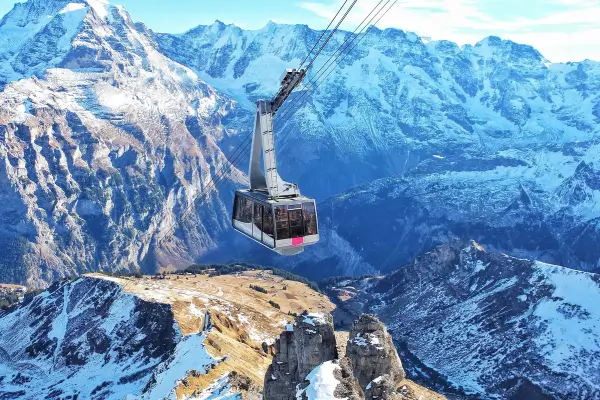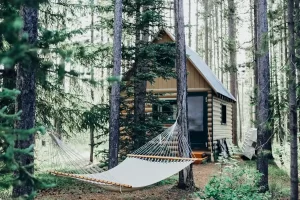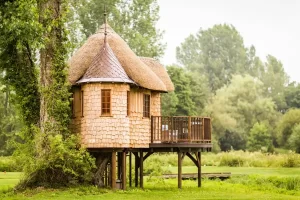In recent years, there has been a significant shift in how travelers approach their adventures. The growing trend of eco-conscious travel reflects a global awareness of the impact tourism has on our planet. Today’s travelers are no longer content with just visiting new places—they seek to do so in a way that respects and preserves the environment. This shift has led to the rise of eco-lodges and green retreats, which offer more than just a place to stay. These accommodations represent a commitment to sustainability, providing guests with a unique opportunity to immerse themselves in nature while minimizing their ecological footprint.
Traditional tourism, while providing economic benefits, often comes at a high environmental cost. From excessive energy consumption to waste generation and habitat disruption, the conventional travel industry can leave a heavy imprint on the natural world. Eco-lodges and green retreats, however, are changing the narrative. By integrating sustainable practices such as renewable energy use, water conservation, and the support of local communities, these accommodations play a crucial role in the broader movement toward sustainable tourism. They not only reduce the environmental impact of travel but also foster a deeper connection between guests and the natural world.
In this article, we’ll explore a curated selection of eco-friendly accommodations from around the globe. From secluded jungle lodges in South America to serene coastal retreats in Asia, each destination is chosen for its commitment to sustainability and its ability to offer travelers a meaningful and responsible way to experience the world. Whether you’re an avid eco-traveler or simply curious about how you can make your next trip more sustainable, this guide will provide you with the insights and inspiration needed to choose the perfect green retreat.
What Makes a Retreat “Green”?
Sustainable Practices
At the heart of any green retreat is a commitment to sustainability, and this begins with the use of renewable energy sources. Many eco-lodges and resorts harness the power of the sun, wind, or water to meet their energy needs, significantly reducing their carbon footprint. Solar panels, wind turbines, and micro-hydro systems are common features in these accommodations, providing clean energy while minimizing reliance on fossil fuels.
In addition to renewable energy, water conservation is a critical aspect of sustainable practices in green retreats. From rainwater harvesting systems to low-flow fixtures, these accommodations implement innovative methods to reduce water usage. Some even treat and recycle wastewater on-site, ensuring that this precious resource is used efficiently and responsibly. By prioritizing water conservation, green retreats help protect local water supplies and reduce the overall environmental impact of their operations.
Eco-Conscious Design
The design of eco-lodges and green retreats goes beyond aesthetics; it is deeply rooted in environmental stewardship. One of the key elements of eco-conscious design is the use of local and sustainable materials. By sourcing building materials from the surrounding area, these retreats minimize the carbon emissions associated with transportation and support local economies. Materials such as reclaimed wood, bamboo, and natural stone not only reduce the environmental impact but also give the structures a sense of place and authenticity.
Moreover, the architecture of green retreats is carefully crafted to blend with the natural environment. Instead of dominating the landscape, these buildings are designed to coexist harmoniously with their surroundings. Whether nestled in a dense forest, perched on a cliff, or situated by a serene lake, the design of these retreats emphasizes a low-impact footprint, ensuring that the natural beauty of the location remains unspoiled. This approach not only reduces environmental disruption but also enhances the guest experience, offering a seamless connection between indoor and outdoor spaces.
Community Involvement
A truly green retreat extends its sustainability efforts beyond its physical operations to include strong ties with the local community. Supporting local communities is a cornerstone of eco-tourism, and many green retreats actively contribute to the social and economic well-being of the areas in which they operate. This support often takes the form of employing local staff, which not only provides jobs but also ensures that guests receive an authentic cultural experience. Local guides, chefs, and artisans bring their knowledge and skills to the retreat, enriching the guest experience with insights into the area’s traditions, cuisine, and crafts.
Furthermore, green retreats often source their food and other products from local farms and producers, promoting sustainable agriculture and reducing the environmental impact associated with long-distance transportation. By prioritizing local produce, these accommodations help preserve traditional farming practices, support small-scale farmers, and ensure that guests enjoy fresh, seasonal, and organic meals. This commitment to community involvement not only strengthens the local economy but also fosters a sense of connection and responsibility between travelers and the places they visit.
Top Eco-Lodges and Resorts Around the World
North America
- Fogo Island Inn, Canada
- Overview: Perched on the rugged shores of Newfoundland, Fogo Island Inn is a masterpiece of modern architecture and sustainability. This luxury eco-lodge offers breathtaking views of the North Atlantic Ocean and provides a truly immersive experience in one of the most remote parts of Canada.
- Location: Fogo Island, Newfoundland, Canada.
- Unique Eco-Features: Fogo Island Inn is designed with sustainability at its core, utilizing solar panels and wood-burning stoves to minimize energy consumption. The inn supports the local community through its social enterprise model, reinvesting profits into the island’s economy and cultural preservation.
- Treebones Resort, USA
- Overview: Located along California’s stunning Big Sur coastline, Treebones Resort offers a unique blend of comfort and ecological responsibility. This eco-resort is known for its “glamping” yurts and breathtaking views of the Pacific Ocean.
- Location: Big Sur, California, USA.
- Unique Eco-Features: Treebones Resort is committed to sustainable practices, including the use of solar energy and a robust recycling program. The resort also operates an organic garden that supplies fresh produce for its on-site restaurant, further reducing its environmental footprint.
Central and South America
- Lapa Rios Lodge, Costa Rica
- Overview: Nestled in the lush rainforests of the Osa Peninsula, Lapa Rios Lodge is a premier eco-lodge that offers an unparalleled connection to nature. Guests can explore the rich biodiversity of the region while staying in sustainable luxury.
- Location: Osa Peninsula, Costa Rica.
- Unique Eco-Features: Lapa Rios Lodge is a model of sustainable tourism, featuring renewable energy sources such as solar panels and rainwater harvesting systems. The lodge actively supports conservation efforts and works closely with the local community to promote environmental education.
- Mashpi Lodge, Ecuador
- Overview: Set deep within the Andean cloud forest, Mashpi Lodge is a haven for nature lovers and eco-conscious travelers. This modern retreat provides a luxurious escape while preserving one of the most biodiverse regions on the planet.
- Location: Chocó Forest, Ecuador.
- Unique Eco-Features: Mashpi Lodge is built with minimal environmental impact, featuring sustainable construction materials and energy-efficient systems. The lodge also conducts scientific research and conservation projects to protect the surrounding ecosystem and its wildlife.
Europe
- Les Fermes de Marie, France
- Overview: Les Fermes de Marie is an exquisite retreat located in the picturesque French Alps, offering breathtaking views of the surrounding peaks and alpine meadows. This luxury eco-lodge is renowned for its dedication to sustainability and its integration with the local mountain culture.
- Location: Megève, France.
- Unique Eco-Features: The lodge is built using traditional Alpine materials and incorporates modern eco-friendly technologies, including geothermal heating and solar energy systems. Les Fermes de Marie emphasizes sustainable practices, such as sourcing local and organic produce, and supports regional conservation efforts through its eco-friendly initiatives.
- Whitepod, Switzerland
- Overview: Located in the Swiss Alps, Whitepod offers a unique glamping experience with its futuristic pod-style accommodations. Each pod provides stunning views of the surrounding mountains while offering a luxurious yet sustainable stay.
- Location: Valais, Switzerland.
- Unique Eco-Features: Whitepod is powered by renewable energy and features eco-friendly heating systems. The resort is committed to reducing its carbon footprint by minimizing waste, conserving water, and promoting responsible tourism in the fragile Alpine environment.
Asia
- Six Senses Yao Noi, Thailand
- Overview: Overlooking the iconic limestone karsts of Phang Nga Bay, Six Senses Yao Noi is a luxury eco-resort that blends sustainability with indulgence. Guests can enjoy stunning views and exceptional service while contributing to environmental conservation.
- Location: Yao Noi Island, Thailand.
- Unique Eco-Features: The resort utilizes solar power, organic farming, and a robust waste management system to minimize its environmental impact. Six Senses Yao Noi also supports marine conservation efforts and local community initiatives, promoting sustainable tourism practices.
- Song Saa Private Island, Cambodia
- Overview: Song Saa Private Island is a luxury eco-resort located in Cambodia’s pristine Koh Rong Archipelago. This retreat offers an exclusive, sustainable escape in the heart of Southeast Asia’s tropical paradise.
- Location: Koh Rong Archipelago, Cambodia.
- Unique Eco-Features: Song Saa is built using reclaimed materials and features a comprehensive environmental management plan, including solar power and rainwater collection. The resort actively participates in marine conservation and community development projects, ensuring that its operations benefit both the environment and local people.
Africa
- Chumbe Island Coral Park, Tanzania
- Overview: Chumbe Island Coral Park is a private nature reserve located off the coast of Zanzibar, offering a unique eco-tourism experience focused on marine conservation. The lodge provides an immersive stay on an island teeming with diverse marine life.
- Location: Zanzibar, Tanzania.
- Unique Eco-Features: The lodge is entirely powered by solar energy and practices rainwater harvesting and composting toilets. Chumbe Island Coral Park is dedicated to the preservation of the coral reef ecosystem and works closely with local communities to promote environmental education.
- Grootbos Private Nature Reserve, South Africa
- Overview: Situated in the heart of the Cape Floral Kingdom, Grootbos Private Nature Reserve offers a luxurious eco-retreat that showcases the region’s extraordinary biodiversity. This reserve is renowned for its commitment to conservation and sustainable tourism.
- Location: Western Cape, South Africa.
- Unique Eco-Features: Grootbos is a pioneer in eco-friendly design, using sustainable building materials and energy-efficient systems. The reserve engages in extensive conservation efforts, including reforestation projects and the protection of endangered species, and supports local communities through education and development initiatives.
Oceania
- Saffire Freycinet, Australia
- Overview: Located on Tasmania’s east coast, Saffire Freycinet is a luxury eco-resort that offers breathtaking views of the Hazards Mountains and Great Oyster Bay. The resort provides an exclusive retreat with a strong emphasis on environmental sustainability.
- Location: Tasmania, Australia.
- Unique Eco-Features: Saffire Freycinet employs sustainable practices such as rainwater harvesting, energy-efficient lighting, and waste reduction programs. The resort is actively involved in local conservation efforts, including habitat restoration and marine protection, ensuring that the natural beauty of the region is preserved for future generations.
- Treetops Lodge & Estate, New Zealand
- Overview: Nestled in the heart of New Zealand’s native forest, Treetops Lodge & Estate offers a secluded eco-luxury experience. This retreat provides guests with the opportunity to explore pristine wilderness while enjoying the comforts of a world-class resort.
- Location: Rotorua, New Zealand.
- Unique Eco-Features: The lodge is constructed from locally sourced and sustainable materials, blending seamlessly with its natural surroundings. Treetops Lodge engages in extensive conservation efforts, including native species protection and reforestation programs, ensuring the preservation of New Zealand’s unique ecosystems.
How to Choose the Right Eco-Lodge or Resort
Consider Your Environmental Priorities
When selecting an eco-lodge or resort, it’s important to align your choice with your environmental priorities. Start by considering your focus on carbon footprint reduction. If minimizing your carbon footprint is a top priority, look for accommodations that utilize renewable energy sources, such as solar or wind power, and offer carbon offset programs. Some eco-lodges go the extra mile by using energy-efficient designs, promoting low-impact activities, and even offering carbon-neutral stays.
If conservation and wildlife protection are more important to you, choose a retreat that actively engages in preserving local ecosystems and protecting endangered species. Many eco-lodges are situated in or near protected areas and contribute directly to conservation efforts. By supporting these establishments, you can be confident that your stay will have a positive impact on the environment and contribute to the preservation of biodiversity.
Research the Location
Understanding the location of your chosen eco-lodge or resort is crucial for a truly sustainable experience. Research the local environment to ensure that the accommodation is situated in an area that supports sustainable practices. Consider factors such as the fragility of the ecosystem, the availability of natural resources, and the potential impact of tourism on the region.
It’s also important to consider the impact of the lodge on the local community. Look for eco-lodges that engage with and support local communities by providing employment opportunities, sourcing local produce, and contributing to community development projects. By choosing accommodations that prioritize community involvement, you can help ensure that your travel has a positive and lasting impact on the people and places you visit.
Check for Certifications
One of the best ways to ensure that an eco-lodge or resort is genuinely committed to sustainability is to check for recognized eco-certifications. These certifications are awarded by independent organizations that assess the environmental and social practices of accommodations. Some of the most reputable certifications include Green Globe, LEED (Leadership in Energy and Environmental Design), EarthCheck, and the Global Sustainable Tourism Council (GSTC).
These certifications indicate that the lodge meets rigorous sustainability standards, covering areas such as energy and water efficiency, waste management, community involvement, and biodiversity conservation. By choosing a certified eco-lodge, you can be confident that your stay aligns with high environmental and ethical standards.
Read Reviews and Testimonials
Finally, reading reviews and testimonials from previous guests can provide valuable insights into the eco-lodge or resort you are considering. Look for feedback from eco-conscious travelers who share your values and priorities. Reviews can offer a realistic perspective on the lodge’s sustainability practices, the quality of the experience, and the impact of the stay on the local environment and community.
Pay attention to details such as how the lodge handles waste, the availability of locally sourced and organic food, and the extent to which the lodge contributes to conservation efforts. Reviews can also highlight any potential shortcomings, helping you make an informed decision and choose an eco-lodge that meets your expectations for a sustainable and responsible travel experience.
Benefits of Staying at Green Retreats
Positive Environmental Impact
One of the most compelling reasons to choose a green retreat is the positive environmental impact of your stay. By opting for eco-lodges and sustainable resorts, you directly contribute to conservation efforts that protect fragile ecosystems and biodiversity. These accommodations often support reforestation projects, wildlife preservation initiatives, and marine conservation efforts, ensuring that your visit leaves a lasting legacy of environmental stewardship. Additionally, by reducing your carbon footprint and supporting renewable energy use, you help mitigate the broader impacts of climate change, making a meaningful difference with every trip.
Immersive Nature Experiences
Staying at a green retreat offers an unparalleled opportunity to connect with nature in a profound and authentic way. These accommodations are often located in remote, pristine environments, far from the hustle and bustle of urban life. Whether you’re waking up to the sounds of the rainforest, exploring untouched beaches, or trekking through mountain trails, green retreats provide a gateway to the natural world. The immersive experiences offered by these lodges, such as guided wildlife tours, nature walks, and stargazing, allow you to appreciate the beauty and complexity of the environment while fostering a deeper understanding of the ecosystems that sustain life on Earth.
Support for Local Communities
Green retreats are often deeply rooted in the communities where they operate, and your stay can have a significant economic and cultural impact. By choosing eco-lodges that prioritize local employment, use local products, and invest in community development, you help support the livelihoods of people in the area. This not only provides economic benefits but also helps preserve cultural traditions and promote social well-being. Many green retreats also offer opportunities for guests to engage with the local community, whether through cultural exchanges, visits to local markets, or participation in community-led projects. This connection enriches your travel experience and ensures that the benefits of tourism are shared equitably with the communities that host you.
Personal Well-being
In addition to the environmental and social benefits, staying at a green retreat can have profound effects on your personal well-being. Eco-friendly environments are often designed to promote health and wellness, offering clean air, organic food, and natural surroundings that rejuvenate the body and mind. Many green retreats incorporate wellness programs such as yoga, meditation, and spa treatments, all set against the backdrop of serene natural landscapes. The slower pace of life, coupled with the opportunity to disconnect from the stresses of modern life, allows you to recharge and find balance. Whether you’re seeking relaxation, adventure, or a deeper connection to nature, a stay at a green retreat can provide the perfect setting for personal growth and rejuvenation.
Challenges and Considerations
Potential Higher Costs
One of the primary challenges travelers may encounter when considering a green retreat is the potentially higher cost. Eco-lodges and green resorts often require more investment to build and maintain due to their commitment to sustainable practices. These costs can include sourcing local and sustainable materials, implementing renewable energy systems, and supporting conservation initiatives. However, while green retreats may come with a higher price tag, they offer exceptional value in terms of environmental impact, unique experiences, and support for local communities. It’s important to balance cost with the long-term benefits, understanding that your investment contributes to a more sustainable future for the planet and the communities you visit.
Accessibility and Remote Locations
Many eco-lodges are located in remote, pristine areas, far from major cities and tourist hubs. While this seclusion is part of their charm, it can also present challenges in terms of accessibility. Reaching these locations may require additional travel time, modes of transportation, and planning. In some cases, the journey to an eco-lodge might involve long drives, boat rides, or even small aircraft flights, which can add to the complexity of your trip. However, the effort to reach these remote destinations is often rewarded with unparalleled natural beauty and a deeper connection to the environment. Being aware of these challenges and planning accordingly can help ensure a smooth and enjoyable journey to your green retreat.
Limited Amenities
When staying at a green retreat, it’s important to adjust your expectations regarding amenities. While many eco-lodges offer luxury accommodations, their focus on sustainability may mean that some conveniences found in traditional hotels are limited or absent. For example, you might encounter water-saving measures like low-flow showers, limited air conditioning, or restrictions on electricity use during certain hours. Additionally, some green retreats may prioritize locally sourced and organic food, which could result in a smaller, seasonal menu. These limitations are part of the eco-conscious experience, encouraging guests to embrace a simpler, more mindful way of living. Understanding and accepting these adjustments can enhance your stay, allowing you to fully appreciate the unique offerings of an eco-lodge.
Conclusion
Choosing eco-lodges and green retreats is more than just selecting a place to stay; it’s about making a conscious decision to travel sustainably. From the positive environmental impact of supporting conservation efforts to the immersive nature experiences and the meaningful support for local communities, green retreats offer travelers a way to make their adventures more responsible and rewarding. While there are challenges, such as higher costs, remote locations, and limited amenities, the benefits far outweigh the inconveniences.
Every small choice you make as a traveler can have a significant impact on the environment and the people who call your destination home. By opting for eco-lodges and green retreats, you contribute to a global movement toward sustainable tourism, ensuring that the places you visit remain unspoiled for future generations. Traveling consciously doesn’t mean sacrificing comfort or enjoyment; rather, it enriches your journey, allowing you to connect more deeply with the world around you.
Now is the perfect time to start planning your eco-friendly getaway. Whether you’re drawn to the remote jungles of Costa Rica, the serene mountains of Switzerland, or the pristine beaches of Cambodia, there’s a green retreat waiting to offer you an unforgettable experience. As you plan your trip, consider sharing your journey and experiences with others. By doing so, you can inspire fellow travelers to make sustainable choices, amplifying the positive impact of conscious travel. Your story could be the spark that encourages someone else to embark on their own eco-friendly adventure.




